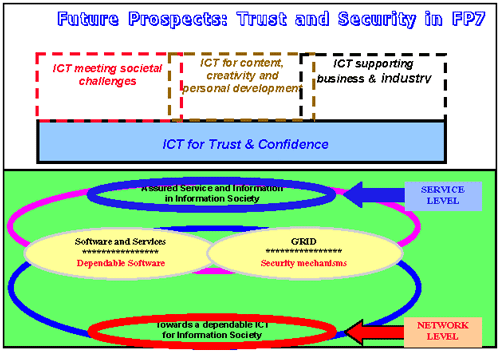
This issue in pdf Subscription Archive: Next issue: January 2006 |
|
||||
Building Trust and Security in Information Society: A Strategic Challenge for European R&Dby Jacques Bus Security, dependability and trust plays a key role in building the Information Society. With the move towards the 7th Framework Programme, the European Union will make research more effective and better tailored to the evolving needs and opportunities with which Europe is confronted. Trust and security are key enablers of the Information Society. For citizens to use and feel comfortable with eGovernment services they must have confidence that their online services are trustworthy and secure. Similarly, for consumers and SMEs to use e-commerce and e-business they need confidence in the security of online transactions. As access to the Internet diversifies, from PCs to digital TVs, mobile phones and wireless devices, people feel increasingly concerned about the protection of their assets and privacy in this networked world. These aspects will become more and more important as we move towards the smart digital environments based on many interacting objects, devices and systems.
In the future, personal area networks and embedded computer chips will be everywhere – in our cars, our homes and even in our clothes. Security in such massively inter-connected environments will require solutions very different to those of today, and its social acceptance will require totally novel approaches to identity and privacy management through user-friendly and trustworthy interfaces, taking into account the privacy needs and data protection regulations in place. Underlying the service and user interface level we must give attention to the information and network security infrastructure. Modern service organisations, such as banking and finance, healthcare, energy, transport and others, rely on ICT for data exchange and control, creating strong mutual dependencies. These critical information infrastructures must be dependable and resilient, protecting against malicious attacks, ensuring tolerance towards and recovery from attacks, and adaptable to the changing security requirements. The Present: Trust and Security in the 6th Framework Programme The Future: Security and Dependability - Trust and Confidence the 6th Framework Programme The overall structure and research priorities of FP7 were proposed in the Communication of April 2005 'concerning the seventh framework programme of the European Community for research, technological development and demonstration activities'. One of the 'Technology Pillars' (TP) proposed under the ICT theme of the Specific Programme 'Collaboration' covers the research activities on 'Software, Grids, Security and Dependability: dynamic, adaptive, dependable and trusted software and services, and new processing architectures, including their provision as a utility'. In addition, one of the domains of 'Applications Research' (AR) is defined to be 'ICT for trust and confidence: identity management; authentication and authorization; privacy enhancing technologies; rights and asset management; protection against cyber threats'. Although TPs and AR are both part of the Specific Programme 'Collaboration' in the theme ICT, they represent different approaches to the research in Trust and Security in ICT. The TP on 'Software, Grids, Security and Dependability' deals with the key technological challenges and components that underpin the provision of both 'assured service and information handling' and 'dependable ICT systems'. It addresses the constitutive fabric of Information Society systems and services. The TP supports and enables applications research (eg e-government, e-business, e-health) where the application drive is the engine for future technological progress. The requirements on trust and confidence in these application areas are however often of a generic nature, exploiting 'security and privacy' technologies all across the different application domains. For this reason the choice has been made to include AR on 'ICT for Trust and Confidence', which would build upon the TP described above, but work in close cooperation with the other AR areas to ensure optimal synergy. Figure 1 shows how 'Trust and Security' is covered in the ICT Theme of FP7. It depicts the two important technology levels: network and services, as well as the crucial role of security and trust in the development of software and services and its infrastructures (ie, GRIDs). This technology development forms the fundament for the application in various domains through the domain 'ICT for Trust and Confidence'. Of course, such visualisation is limited. It may however help us in stimulating and managing the discussion with the European stakeholders such as researchers, industries, users, etc. in order to develop a strategic agenda for security and trust in FP7. Conclusion The content of this paper is the sole responsibility of the author and in no way represents the view of the European Commission or its services. Links: Please contact: |
||||


